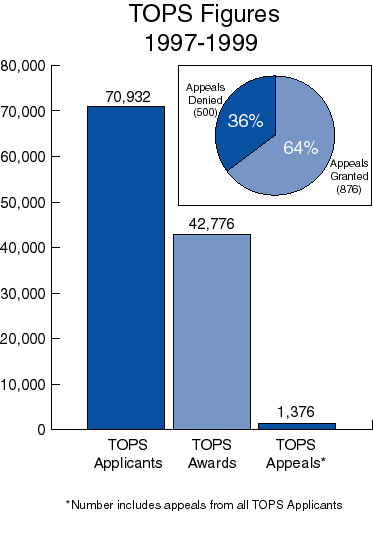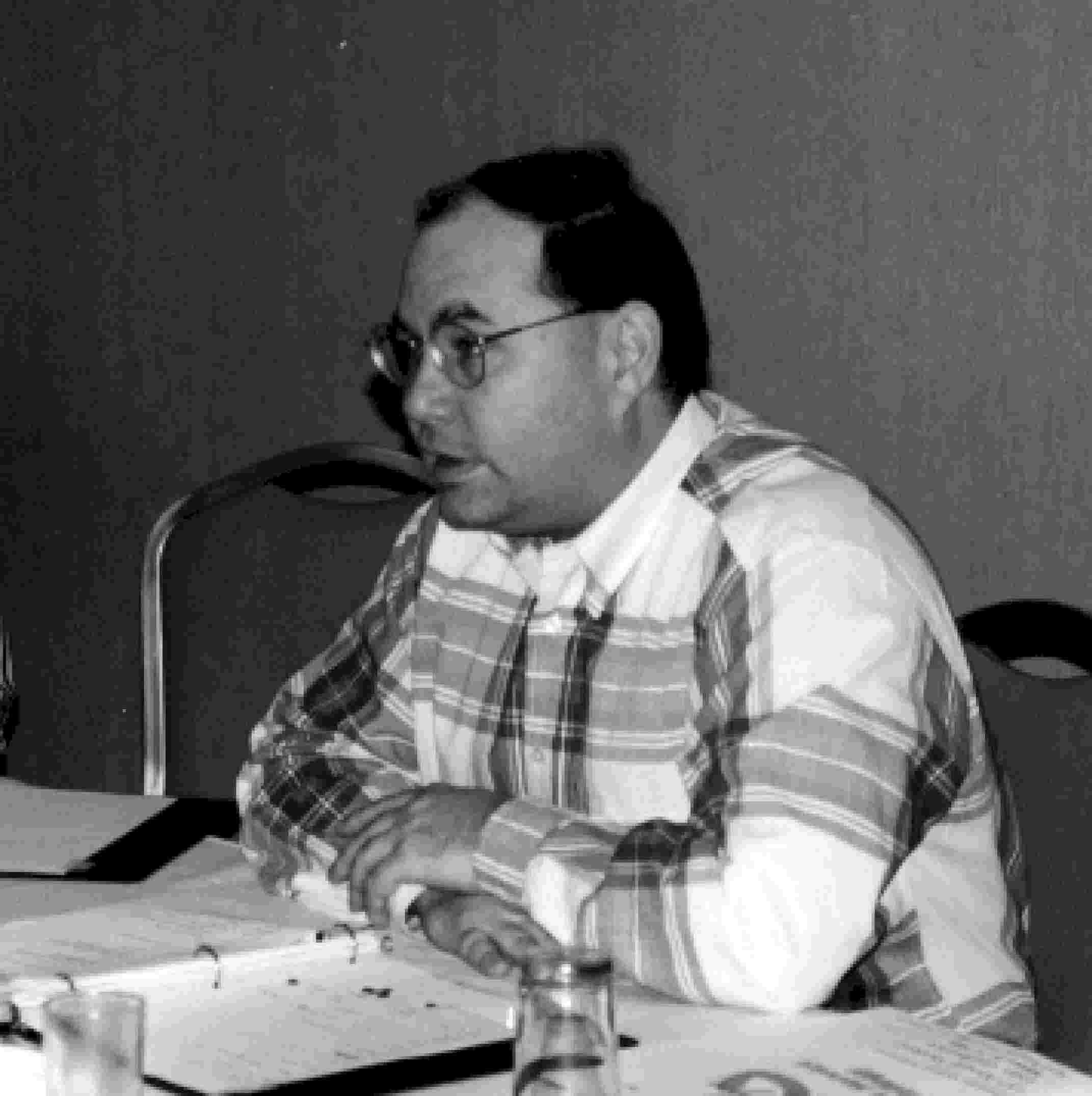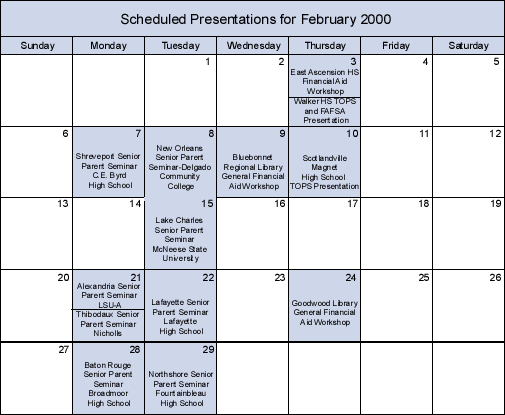
|
February 2000 Newsline Articles |
TOPS appeals procedure streamlined
At its January 11 meeting, the Louisiana Student Financial Assistance Commission approved procedural changes which will simplify, clarify and expedite the appeals process for Tuition Opportunity Program for Students (TOPS) award hopefuls appealing canceled or denied awards.
The commission’s decision amended Section 2103 of the TOPS rules, which enables students to request exceptions for the initial and continuous enrollment requirements and details those exceptions. The amendment added several new exception categories, consolidated others and established May 30 of the academic year in which the student seeks reinstatement as the standard deadline for all appeals.
Previously, a wide variety of filing deadlines existed, dependent on the particular exception requested. There was also some overlap within categories, for example: the rehabilitation category included both physical and substance abuse treatment, which now have been separated. Additionally, there were no provisions made for students suffering from permanent disabilities which prevented them from meeting the full-time enrollment requirement. Now, those students may attend college part time.
As a result of the commission action, all appeal requests will now be evaluated by criteria established for 11 redesigned categories.
The first 10 categories are called exceptions. Exceptions are appeals with objective and measurable standards set in rule and decided in-house by senior staffers of the Louisiana Office of Student Financial Assistance (LOSFA) — the state agency charged with administering TOPS. Exceptions are routinely granted by LOSFA to students whose appeals are supported by the required documentation.
The 11th category is called appeal due to exceptional circumstances — a catch-all classification for situations not covered in the other 10 categories. This category for the first time defines eight situations as being objective and, as such, nonappealable. The remaining category 11 appeal decisions require subjective judgment on the part of the senior staff and are therefore reversible by the commission.
According to LOSFA records, most
appeals are from recipients who have been unable to meet continuation
requirements for their awards because of personal reasons, such as death in the
immediate family or illness, followed by appeals from students who requested a
waiver of the eligibility requirements, such as the first-time freshman
provision.
Since the program’s inception in 1997, a total of 70,932 applications have
been processed. Of those, 42,776 students were awarded (including 16,669 whose
awards were renewed). From the group of applications processed, 1,376 student
appeals have been reviewed by either the commission or LOSFA. Of these 1,376
appeals, only 500 (36 percent) were denied. Thus, only 1.9 percent of the total
70,932 processed applicants have filed appeals.
Who can file an exception/appeal request
Any student declared ineligible for
TOPS because of failure to meet the initial or continuous enrollment
requirements may request award reconsideration, based on one or more of the 11
exception/appeal categories.
How to file an exception/appeal request
To submit a request for an exception/appeal, appellants should contact the LOSFA Public Information and Communications Division at (800) 259-5626, Ext. 1012 to obtain the necessary Request for Exception to the Continuous or Full-Time Enrollment Requirement Form and to determine the documentation required to support each request. A brief overview of the revised process follows.
A. Submit to LOSFA a completed Request for Exception to the Continuous or Full-Time Enrollment Requirement Form as soon as possible but no later than May 30 of the academic year in which the student wishes to be reinstated.
B. Include a cover letter detailing the nature of the exception request and specific circumstances. Include the student’s Social Security number in the body of the letter and attach the student’s most recent official college transcript.
C. Appeal decisions are usually reached within 90 days of LOSFA receiving all required documentation. When the appeal has been decided, students will be notified by mail of the decision.
D. When a category 1-10 request is granted, the recipient will be reinstated on TOPS if enrolled in the first fall, winter or spring term which immediately follows the exception end-date.
E. When a category 11 appeal is denied, the student may appeal the decision to the commission, unless the denial was based on items 11(a) through (h).
Exception/appeal categories
1. Parental leave: The recipient is pregnant or caring for a newborn or newly adopted child less than one year of age. The maximum length of exception is up to two consecutive semesters (three consecutive quarters) per child.
2. Physical rehabilitation program: The recipient is receiving physical rehabilitation in a qualified program and from a qualified medical professional. The maximum length of exception is up to four consecutive semesters (six consecutive quarters) per occurrence.
3. Substance abuse rehabilitation program: The recipient is receiving substance abuse rehabilitation in a qualified program and from a qualified professional. The maximum length of exception is up to two consecutive semesters (three consecutive quarters), one time only.
4. Temporary disability: The recipient is recovering from an accident, injury, illness or required surgery, or is providing continuous care to his/her spouse, dependent, parent or guardian due to accident, illness, injury or required surgery. The maximum length of exception is up to four consecutive semesters (six consecutive quarters) for a recipient or up to a maximum of two consecutive semesters (three consecutive quarters) for care of a disabled dependent, spouse, parent or guardian.
5. Permanent disability: The recipient is permanently disabled in a manner that prevents the student from attending classes on a full-time basis. The maximum length of exception is the part-time equivalent of up to eight full-time semesters of postsecondary education.
6. Exceptional educational opportunity: The recipient is enrolled in an internship, residency, cooperative work or work/study program or similar program related to the student’s major; or otherwise has an opportunity not specifically sponsored by the school attended but which, in the opinion of the student’s academic dean, will enhance the student’s education. Participation in one of the programs does not qualify as an exception to the initial enrollment requirement. The maximum length of exception is up to two semesters (three consecutive quarters) or required program of study.
7. Religious commitment: The recipient is a member of a religious group that requires the student to perform certain activities or obligations which necessitate taking a leave of absence from school. The maximum length of exception is up to four consecutive semesters (six consecutive quarters).
8. Death of immediate family member: The recipient’s spouse, parent, guardian, dependent, sister, brother or grandparent dies. The maximum length of exception is one semester (two quarters) per death.
9. Military service: The recipient is in the United States Armed Forces Reserves and is called on active duty status or is performing emergency state service with the National Guard. The maximum length of exception is up to the length of the required active duty service period.
10. Transfer/graduation part time: A recipient who can complete his or her remaining program requirements in a single semester as a part-time student. The maximum length of exception is one semester or one quarter.
11. Exceptional circumstances:
The recipient has exceptional circumstances, other than those listed in
categories 1-10, which are beyond his immediate control and which necessitate
full or partial withdrawal from, or non-enrollment in, an eligible postsecondary
institution. The maximum length of exception is up to two consecutive semesters
(three consecutive quarters).

|
The following situations are defined
as not being exceptional circumstances and therefore, are nonappealable: |
f) Voluntary withdrawal from
school to move out of state or pursue other interests or activities.
g) Claims of receipt of advice
that is contrary to: these rules, public information promulgated by LOSFA, the
official award letter, or the TOPS Recipient's Rights and Responsibilities
document which details the requirements for full-time continuous
enrollment.
h) Failure to provide or respond
to a request from LOSFA for documentation within 30 days of the date of the
request.
For more information, contact LOSFA's
Public Information and Communications Division at (800) 259-5626, Ext. 1012
Senior parent seminars slated statewide
The Louisiana Office of Student Financial Assistance (LOSFA) is sponsoring a series of Senior Parent Seminars called "Putting Together the Student Financial Aid Puzzle" in February on week nights from 6 - 8:30 p.m. at educational institutions across the state.
Senior Parent Seminars are free and open to parents of high school seniors graduating in 2000 who are interested in obtaining a postsecondary education.
The 2 ½-hour seminars will include the following financial aid topics:
Seminars will be held at the following dates and locations:
Feb. 7 - Shreveport: C.E. Byrd High School
Feb. 8 - New Orleans: Delgado, Main Auditorium, Bldg. 1
Feb. 15 - Lake Charles: McNeese, Baker Auditorium, Farrar Hall
Feb. 21 - Alexandria: LSU-A, Barbara Caffey Annex Room
Feb. 21 - Thibodaux: Nicholls State University, Student Union Ballroom
Feb. 22 - Lafayette: Lafayette High School
Feb. 28 - Baton Rouge: Broadmoor High School
Feb. 29 - Northshore: Fontainebleau High School
Due to an error made by National Computer Systems during a server conversion, all 1999-2000 Free Application for Federal Student Aid (FAFSA) on the Web initial applications, renewal applications and corrections made between 8:40 p.m. Dec. 15, 1999 and 1:34 p.m. Dec. 16 were lost and are not recoverable. Any student who filed during that time period must refile. This problem did not affect Tuition Opportunity Program for Students (TOPS) initial applicants or renewal students, as 2000-2001applications could not be filed before Jan. 1.
The Louisiana State University Medical School has officially changed its name to Louisiana State University Health Sciences Center.
LOSFA Pre-Claims dates changed: LOSFA has changed the date a lender may file for Pre-Claims Assistance — or Lender’s Request for Assistance (LRA) — from 90 days of delinquency to 60 days. Also, the date at which a lender should cancel or avert their LRA has been changed from zero days of delinquency to 30 days or less delinquent. This change was published Oct. 6, 1999 as Loan Program Memorandum L99-12. While most LOSFA lenders have adhered to these dates, apparently some did not receive the LPM. If your institution is not receiving these notices, please contact LOSFA’s Public Information and Communications Division at (800) 259-5626, Ext. 1012 to be added to our mailing list.
LOSFA’s Program Review Division has hired two new auditors: Michael Roberts, who started Nov. 15, 1999 and Blair Daggs, who started Dec. 13. Dianne Collins has transferred from Program Review to the Information Systems Division effective Dec. 6. and Ida Minor has transferred from Program Review to Information Systems effective Jan. 24.
The Urban League of Greater New Orleans celebrated its 22nd Anniversary Equal Opportunity Day Dec. 3, 1999 at the Fairmont Hotel in New Orleans. Representing LOSFA at the event were Assistant Executive Director Melanie Amrhein and School and Lender Services Representative Kelly Cormier. The team presented TOPS and LOSFA program information sessions to more than 400 academically promising juniors from New Orleans public schools. The league provided a series of morning workshops intended to provide the juniors with the skills and information necessary to succeed in the new millennium, topping off the event with a luncheon with business sector representatives. The Urban League of Greater New Orleans is a United Way agency which promotes racial and social justice.
If your institution has a newsworthy
update you would like to see included in the News and Updates section of
Newsline, please contact the Publications unit of LOSFA's Public Information and
Communications Division at (800) 259-5626, Ext. 1107.
Mapping
Your Future on World Wide Web
Coalition of financial aid
professionals provides online resource, counseling, chat nights
Since 1997, Mapping Your Future has served as a financial aid signpost on the
World Wide Web. The comprehensive Web site, which is sponsored and maintained by
a coalition of 29 guaranty agencies, offers services ranging from expert
counseling and career planning to school selection, creating a
"one-stop-shop" for both the college-bound student and the concerned
parent. The Louisiana Office of Student Financial Assistance (LOSFA) has been a
site sponsor since November 1999.
The multifaceted Mapping Your Future Web site, located at http://www.mapping-your-future.org, has garnered accolades from students and educators alike. To continue providing the top-of-the-line service and content the site’s visitors have come to expect, Mapping Your Future has assembled a staff of professionals and volunteers, including several LOSFA staffers. Together, this assemblage is dedicated to bringing easily accessible counseling options for college, career and financial aid choices to students and families.
 Representing LOSFA at Mapping Your Future’s winter quarterly meeting, Jan. 13-14, are, from left, Gus Wales, Public Information and Communications (PIC); Melanie Amrhein, Executive Division; Terry Tuminello, Information Systems; Dawn Love (standing), PIC; and Lynda Downing, Pre-Claims. |
With the input of these professionals, the site has evolved into the ultimate financial aid resource on the Web. Its wide range of informative features include:
The site has also simplified the federally mandated loan entrance and exit counseling requirements associated with the attainment of a Federal Stafford loan by placing the process online. |
Mapping Your Future’s online loan entrance and exit counseling services, created through the involvement of both students and financial aid professionals, have proved two of the most popular features on the site. To date, roughly 709 schools participate in the entrance counseling with 163,620 students taking advantage of the service, while 509 schools are involved with Mapping Your Future’s exit counseling with a total of 39,597 students utilizing that online capability.
|
Mapping Your Future has also opened its site
to school- and state guaranty agency- sponsored chat nights. At the conclusion of each chat night, questions and answers are posted and archived, providing access for future visitors to the Web site. Upcoming chat events focus on the
topics of the FAFSA and Financial Aid - Feb. 1; Careers, Summer Jobs and
Internships - March 14; and Nontraditional Students - June 13. |
 During Mapping Your Future's winter quarterly meeting, held Jan. 13-14 at the Monteleone Hotel in New Orleans, staff member Marc Lazo presents a demonstration of the Web site’s chat technology and fields questions from committee members on the chat process for both counselors and visitors. |
The site promotes early awareness among middle school students, and has even developed the graphics-rich, interactive career exploration adventure CAREERSHIP to appeal to this age group.
A variety of projects geared toward improvements in counseling families and students are already underway for Mapping Your Future in the year 2000. For more information, visit the Web site at http://www.mapping-your-future.org.
New
FAFSA has drug-related question No. 28
The 2000-01 Free Application for Federal Student Aid, recently modified to include several changes, is now available from the federal processor. Forms may be obtained by calling (800) 433-3243 or accessing the FAFSA Web site at http://www.fafsa.ed.gov.
Changes to this year’s application now require students to answer three questions which address drug-related convictions, IRS income verification and parents attending college.
New federal drug laws have prompted the inclusion of question No. 28 on the FAFSA. This question states, "If you have never been convicted of any illegal drug offense, enter No. 1 in the box and go to question 29. A drug-related conviction does not necessarily make you ineligible for aid; call (800) 433-3243 or go to http://www.fafsa.ed.gov/q28 to find out how to fill out this question."
Question 28 may be answered with three possible responses: 1, 2 or 3. The student must provide only one answer. Students should not count juvenile convictions or convictions which have been removed from their records.
An answer of No. 1 means the student may be eligible to receive federal student financial aid for the 2000-01 award year. An answer of No. 2 means the student may become eligible for aid at some point during the 2000-01 award year – earlier, if the student completes an acceptable drug rehabilitation program. (Failure to complete a drug rehabilitation program may impose a time penalty on the student’s eligibility for federal aid.) An answer of No. 3 means the student is not eligible to apply for federal aid for 2000-01, unless the student completes an acceptable drug rehabilitation program.
An acceptable drug rehabilitation program must include at least two unannounced drug tests and either be qualified to receive funds from a federal, state or local government or from a federal- or state-licensed insurance company; or be administered or recognized by a federal, state or local government agency or court, or a federal or state-licensed hospital, health clinic or medical doctor.
Students should enter No. 1 if one or more of the following applies:
• never been convicted for possessing
or selling illegal drugs;
• completed an acceptable drug rehabilitation program since last conviction;
• had all convictions for selling or possessing illegal drugs removed from
record;
• been treated as a juvenile for all convictions;
• no more than one conviction before July 1, 1998, for selling illegal drugs;
• no more than one conviction before July 1, 1999, for possessing illegal
drugs; or
• no more than two convictions before July 1, 1998, for possessing illegal
drugs.
Students should enter No. 2 if they have been charged with:
• Possession of Illegal Drugs
• Sale of Illegal Drugs
Only one conviction: Did the conviction occur on or after July 1, 1998 and on
or before June 30, 1999?
Only two convictions: Did the second
conviction occur on or after July 1, 1998 and on or before June 30, 1999? If so,
the student may
become eligible for financial aid two years from the second
conviction date.
Students should enter No. 3 if they
have:
• more than two convictions for possessing illegal drugs;
• more than one conviction for selling illegal drugs; or
• one or two convictions for possessing illegal drugs, or one conviction for
selling illegal drugs, if the dates of the conviction do not fall within
the ranges described for No. 1 or No. 2.
If a student becomes eligible for federal aid by completing an acceptable drug rehabilitation program, or if the eligibility date arrives, the student should contact the school financial aid office. If the student is convicted of possessing or selling drugs after submitting the FAFSA, the student must notify the school financial aid administrator immediately. The student will lose eligibility and be required to pay back all aid received after the conviction.
Students who complete the FAFSA on the Web will be able to use an embedded interactive questionnaire that determines the correct answer for them. Students who file by paper can call the 800 number and speak with an operator who will help determine the answer to question 28 based on the student’s information. The operator will also calculate an eligibility date for the student.
Students who leave the question blank will receive a Student Aid Report (SAR) comment 53 along with a "Worksheet for Question 28." Students who answer No. 2 will receive a comment 54 along with their SAR, instructing them to notify their aid administrator when the period of ineligibility ends. Students who answer No. 3 will receive a worksheet and a comment 58 along with their SAR.
In other changes to the FAFSA, questions 61-64 collect parents’ Social Security numbers and last names for the Department of Education, which has the authority to verify reported income with the Internal Revenue Service.
In addition, questions 66 and 87 ask for the number of people in the student’s household who are attending college, now excluding parents who are in college.
LOSFA
attends Mapping Your Future in Big Easy
The Louisiana Office of Student Financial Assistance, which recently became part of Mapping Your Future’s team of professionals as an official sponsor, joined the organization for its quarterly meeting Jan. 13-14 in New Orleans.
Representing LOSFA during the conference were Melanie Amrhein, Executive Division; Lynda Downing, PreClaims; Dawn Love, Public Information and Communications (PIC); Terry Tuminello, Information Systems; and Gus Wales, PIC.
|
The two-day event included an update on the state of the site and presented sponsors with an open forum to share concerns and provide suggestions for improvement. Mapping Your Future team members also participated in break-out sessions in which they focused on particular areas of the site’s development, including default prevention, content and promotions. A number of noteworthy items were discussed or resolved, including:
|
 Steering Committee Chair Larry Sharp of the New Jersey Higher Education Assistance Authority welcomes team members to the Mapping Your Future winter quarterly meeting, held Jan. 13-14 in New Orleans. |
For more information on Mapping Your Future, visit the coalition's Web site at http://www.mapping-your-future.org

Click here ![]() to return to February 2000 Newsline Topics
to return to February 2000 Newsline Topics
Click here ![]() to return to Newsline Home page
to return to Newsline Home page